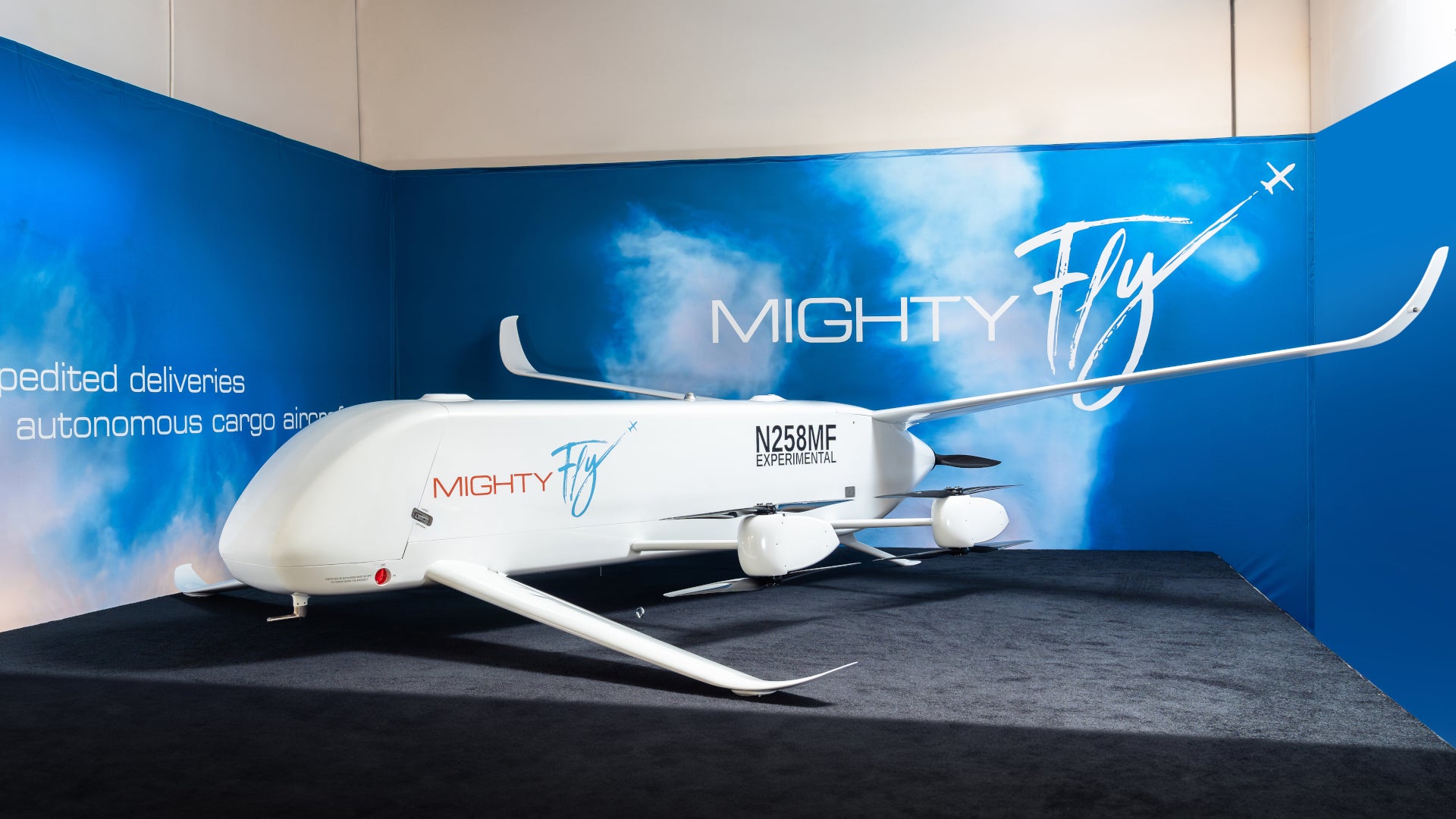Supply chains don’t run themselves. At least, not yet.
San Francisco Bay Area-based MightyFly on Friday unveiled the 2024 Cento: its autonomous, third-generation, electric vertical takeoff and landing (eVTOL) cargo aircraft for same-day delivery. The announcement comes almost one calendar year after the company revealed its second-generation design.
Like a delivery van, the Cento will arrive at a fulfillment center, receive packages, fly to a destination, unload its cargo, and take off for its next delivery. All of those operations will be automated and monitored remotely from a command center. The aircraft is designed to carry up to 100 pounds of cargo over 600 sm (521 nm), cruising at 150 mph (130 knots).
MightyFly also announced that it received a special airworthiness certificate and certificate of authorization from the FAA to establish an air corridor between California’s Byron Airport (C83) and New Jerusalem Airport (1Q4), up to 5,000 feet agl. It expects to begin flight testing along the route in the coming months.
The 2024 Cento unveiling event at MightyFly’s San Leandro, California, headquarters featured stationary aircraft demonstrations for a crowd of partners, investors, potential customers, and even government representatives.
“MightyFly’s new eVTOL will revolutionize industries, such as manufacturing, retail, and healthcare, and will transform life in rural and remote areas,” said Manal Habib, co-founder and CEO of MightyFly. “All of us at MightyFly are extremely excited to be working at the forefront of a new era of automation and innovation.”
The Specs
According to MightyFly, the new design’s biggest advantage is its ability to accommodate a wide range of payloads’ center of gravity. A basketball hoop, for example, would typically be difficult to transport because of its odd shape and weight distribution. Cento, though, can handle a variety of cargo contents, densities, loading orders, and tie-down positions.
“This design attribute is expected to be a key technology differentiator for the Cento platform and its utility to be extremely valuable and competitive in the market,” MightyFly said in a news release.
The 2024 Cento also introduces a significantly larger cargo bay than its predecessor. MightyFly optimized the cargo area to hold as many packages as possible while sticking to the aircraft’s 100-pound capacity.
This, the company said, will open up use cases in logistics, manufacturing, pharmaceutical, retail, automotive, and oil and gas. The eVTOL could also be used for humanitarian aid or disaster relief or be deployed on defense or resupply missions. It can even carry refrigeration boxes, often used for organ donor and blood bag transport in the healthcare industry.
The third-generation design flies on its own, and can load and unload packages autonomously. MightyFly’s Autonomous Load Mastering System (ALMS) can open and close the cargo bay door, secure packages in (or eject them from) the cargo hold, and even sense the payload’s weight and balance to determine its center of gravity. All of this minimizes the need for ground support in Cento operations.
The company is working with Agility Prime, the vertical lift division of the U.S. Air Force’s innovation arm, AFWERX, and the Air Mobility Command to further develop ALMS—and possibly uncover a few Air Force use cases along the way.
Some other features of the upgraded model include:
- Bi-wing design to enable substantial trim of the aircraft’s center of lift
- Structural conductors for reduced weight and improved reliability
- Composite structure to boost payload capacity
- Use of the canard for landing gear for reduced drag and increased efficiency
MightyFly completed production of the third-generation Cento this month and will soon begin aircraft qualification tests, picking up the test plan of its previous model. It also expects to launch A-to-B test flights between Byron and New Jerusalem airports, which will see the eVTOL integrated alongside GA aircraft. The next step: A-to-B customer flight demonstrations.
The first of these may come in the fall when the firm plans to publicly debut point-to-point autonomous cargo delivery in Michigan. The state contracted MightyFly for the flights last year, and the company is reportedly in discussions with potential business partners to expand into the region.
Michigan also recently poured $7 million into a drone park at 97-year-old Battle Creek Executive Airport (KBTL). The site will host drones in addition to eVTOL aircraft and is billed as the Silicon Valley of Michigan, with hopes for it to one day lead the emerging advanced air mobility (AAM) industry.
MightyFly is also scheduled to demonstrate autonomous loading, unloading, and balancing of packages for the Air Force in 2025, followed by additional proof of concept programs.
Like this story? We think you’ll also like the Future of FLYING newsletter sent every Thursday afternoon. Sign up now.
